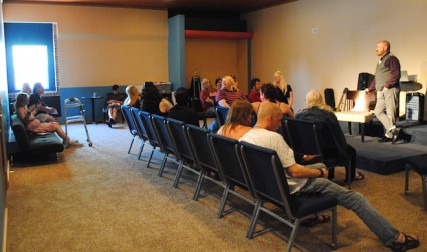When he was about 18 years old, Jonathan Scott Warren, known as Scotty, left his hometown in Sandpoint, Idaho to ride the rails with the hobos.
He was going to tell them about Jesus.
His ride lasted 36 years, until his liver and kidneys failed on April 15.
For Scotty, life on the streets came with a drug and alcohol addiction, but homeless never took away his gentleness and charm, his family and friends recalled Saturday at a memorial service held at The Gathering House.

“I remember in 1979 and Larry Norman and all these other artists singing songs about how Jesus was going to come back at any moment. I could feel the energy and zeal of somebody saying ‘Hey we’re out of time, I’m just gonna’ ride the rails and tell the hobos Jesus loves them’,” said Pastor Rob Bryceson of The Gathering House. “That was his goal. He was going to carry the message of John 3:16.”
Bryceson, who knew Scotty from his church’s former homeless ministry in downtown Spokane, said out of the hundreds and hundreds of homeless people he’s served throughout his ministry, the twinkle in Scotty’s blue eyes made him stand out.
“It was like he was mischievous, or happy. Something in his soul came out in those beautiful blue eyes and what I liked about him is that after years and years and years spent on the streets, he never got jaded and he never got hardened,” Bryceson said.
He would climb into Dumpsters seeking treasure, then give those gems to his friends or caseworks, or use his skills as an artist to make them into picture frames or walking sticks for other people.
But Scotty had a difficult upbringing, Bryceson explained, and that unresolved pain derailed the hopes he had for his life.
At the service Bryceson prayed that God would reward Scotty for his faith, and relieve him of the heartache he had been carrying for so long.
Guests at the memorial told fond stories about Scotty, like how he would regularly check in with his sister, Cindy. He’d ask her how to make dandelion wine or how he and his road buddies could cook a turkey for Thanksgiving, even though they didn’t have a kitchen. He’d come home every one, or two or three years, have a shave a shower and get new clothes.
“It was a lifestyle he loved, and we understood that,” said his niece, Rachael Lapeyre.
She said her family never felt abandoned by Scotty. Others may have seen him as a junkie, or a street person, but she said he was someone who mattered, just like all transients matter.
“He left a huge footprint on this planet, even though most people don’t know he existed,” she said.
When asked where he’d been, Scotty once told a church newspaper, “Baby, I’v been coast-to-coast on a piece of toast.”
He’s known in the homeless community for helping others however he was able. His family, Lapeyre said, extends to all those her uncle adopted in his travels.
She was with him when he died last month. She sat next to him in the hospital, stroked his hair and played music for him on her phone. He loved music. “Freebird” was his favorite. A tear rolled from his eye, and she knew he could hear, and understood he wasn’t alone, Lapeyre said. It was important, she said, for family to be with him.
Bryceson said without Scotty, there is a hole in Spokane.






